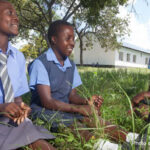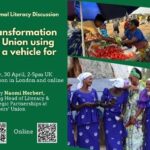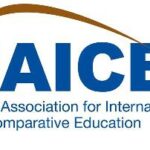2x Part-time ethnographer roles on an exciting, innovative research project
We are a collective of researchers from the UK, Nigeria and South Africa. In January we began a two-year UK Arts and Humanities Research Council (AHRC) funded study with the title: Ibali: storying new discourses of educational inclusion/exclusion in the UK, Nigeria and South Africa. The research is focusing on the commonalities and differences of how inclusion and exclusion are experienced across education systems in these three countries.
We are looking for two part-time ethnographers to join our team: one who is based in and who has undertaken their education and academic training primarily in the UK, and one who is based in and has undertaken their education and academic training primarily in Nigeria (they will join our South African ethnographer who co-wrote the grant).
About the study
There are three strands to the research:
- a digital storytelling approach to generate new discourses around inclusion and exclusion in the three contexts;
- a critical, ethnographic evaluation of the storytelling research process to explore how storytelling could be better and more ethically used in research and;
- a storytelling research knowledge exchange Hub.
Work on the research will be highly collaborative (across the entire time) and creative (involving methodological experimentation and innovation). The ethnographers will collectively be responsible for a multi-perspective ethnography which will generate continuous data across the storytelling strand. The ethnographers will deploy an overarching set of data-generation processes with individual innovations. They will commit to a set of methods to ensure consistency with the comparative nature of the study, but will locate these methods within guidelines, predominant practices and contemporary ideas from their respective countries. Once the methodology is established, they will individually and collaboratively document and analyse the storytelling workshops and events through three geo-politically distinct lenses.
While the ethnographic strand is separate, we envisage the ethnographic and storytelling teams working in close collaboration across the two years. We do not consider this to be an authoethnography, but an iterative, critically reflective and dialogical study. We know stories can be used to support local and policy change. However, this process and the challenges and tensions involved are not fully understood. A key argument emerging from Ibali is that storytelling research requires closer scrutiny and documentation to interrogate how it can contribute to knowledge generation and its potential for engaging wider publics.
While the study was designed with international travel, we may have to reconsider the approach when we have a better idea of what is possible and safe during the fieldwork phase.
About the role
There will be approximately 96 days work across two years. The role will involve working with the other ethnographers and core team to develop an ethnographic strategy which will involve attending and documenting storytelling workshops and events, creatively generating data with storytelling facilitators, participants and audiences, analysing the ethnographic data, contributing to the publications strategy and co-authoring outputs.
The storytelling approach is participatory and to research such a process might require the ethnographers to find ways of participating too. This will enable the ethnographers to experience the creative outlets participants tap into, although their role will be distinct from the facilitators.
While some team meetings, workshops and events will involve some intensive periods of time-commitment (either face-to-face or virtual, pandemic depending), in general the role will entail a few hours of commitment per week which can be fulfilled remotely.
There is a daily-rate of reimbursement for the work, and travel expenses and related costs will be covered by the project.
About the person
The role will suit someone who is passionate about education, creative research methods and inclusion. We would prefer applicants with a postgraduate degree in a related field and with experience of using ethnographic methods. While you do not need to have prior experience with storytelling, you need to be open to learning new methods, and curious about improving your own research. You should also be able to work in a collaborative way.
As set out above, there are two roles available: one for someone who is based in and who has undertaken their education and academic training primarily in the UK, and one who is based in and has undertaken their education and academic training primarily in Nigeria.
You will need a reliable internet connection to enable you to attend online meetings and workshops.
You will have a desire to undertake international travel (providing it is safe to do so).
You will have a commitment to team-working and to collectively challenging normative research processes in a constructive way that is respectful of difference and diversity.
How to Apply
Please send your CV and a cover letter (each not exceeding two-pages) to Dr Jennifer Agbaire (jennifer.agbaire@open.ac.uk) by 11.59pm GMT on Monday, January 31st, 2022.
You may also get in touch with any informal questions about the role in advance of your application.





